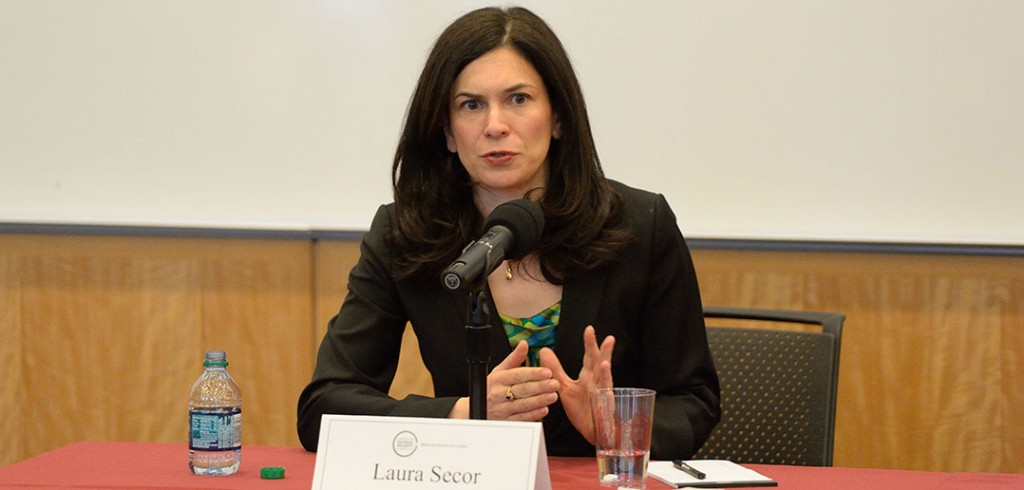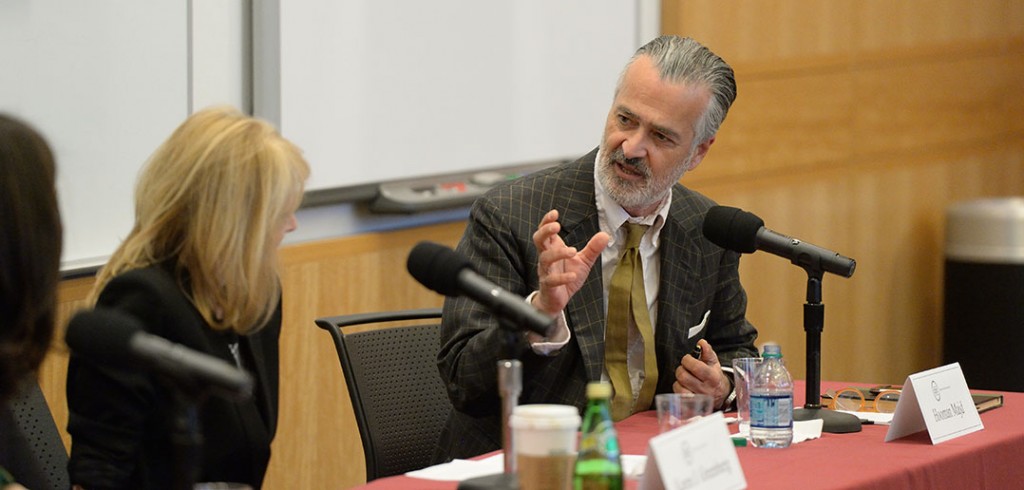Two journalists who reported extensively on Iran over the past decade discussed the country’s parliamentary elections, the role of women in Iranian society, and the country’s nuclear deal with the United States during “Iran in Context,” an hour-long event hosted by Fordham Law’s Center on National Security on February 23.
Laura Secor, author of Children of Paradise: The Struggle for the Soul of Iran, and Hooman Majd, an Iranian-American who works for NBC News and has written three books on Iran, also shared insights into the country’s relationship with Russia, its involvement in the fight against ISIS, also known as Daesh, and its leaders’ views on American presidential candidates. Center on National Security Director Karen Greenberg served as moderator.

The event took place just three days before Iranian voters cast ballots to elect members of the country’s 290-seat parliament and 88-member Assembly of Experts. Upcoming elections and persistent U.S. media coverage of Iran made the Law School event’s timing “serendipitous,” Greenberg told the audience.
“If we were listing countries in the U.S. lexicon, it’s quite extraordinary how often Iran is not just in the news but in the headlines,” Greenberg said before introducing the panelists.
The parliamentary elections will be a referendum on President Hassan Rouhani, who has sought to build a coalition of centrists and reformers against hardliner opposition, Majd stated. Rouhani’s major achievement so far in his first term—his ability to secure a nuclear deal with the United States and other world powers—has been met with both optimism and cynicism at home, the NBC News journalist said.
Rouhani’s pursuit of the nuclear deal, Majd and Secor agreed, took priority over campaign promises he made to overturn hardline domestic policies endorsed by his predecessor, Mahmoud Ahmedinejad, a Holocaust denier whose pursuit of nuclear weapons resulted in crippling economic sanctions for the nation of 77 million people.
“Rouhani came into office in 2013 with promises of opening up the political space,” Secor said. “It hasn’t happened.”
Secor started the reporting for her book near the end of Iran’s Reform Period, which lasted from 1997 to 2005, when Ahmedinejad rose to power. At the time, no narrative history existed about the reformist movement in Iran, a country she described as a “dynamic showcase” for ideas. She sought to fill the vacuum.
Contrary to its image under Ahmedinejad, Iran is “a country where ideas matter,” where abstract philosophical and poetic thinkers hold a culturally significant place, Secor explained. Despite public perception in the United States, Iranian women have a greater role in public life than do their peers across the Middle East, she added, although the country’s legal system is still slanted against women. For example, women are ineligible to serve as president or as a judge.
Whereas reformists and hardliners have displayed competing visions for Iran in the past two decades, the country’s suspicions of U.S. capitalism and imperialism and Soviet Union-style communism remain strong, said Majd, who started reporting on Iran after a career in the music business.
Iran is watching the U.S. presidential race with a sense of surprise and amusement at the unlikely emergence of Donald Trump as the Republican frontrunner, Majd said, pointing out that Iranian leaders generally favor Republican leadership because they know where they stand. Trump and his GOP adversaries are in vehement opposition to the 2015 nuclear deal with Iran.

While Iran and Russia have a shared interest in defeating ISIS, the marriage between the two countries is “one of convenience” not born of any ideological love, Majd noted. Iranian leaders initially supported Syrian President Bashar al-Assad, the NBC News reporter explained, because Syria stood as a lone Middle Eastern ally in Iran’s conflicts with countries like Iraq, but many are questioning the wisdom of supporting him, given Syria’s complicity in the rise of ISIS.
Under Rouhani’s leadership, Iran has taken steps to distance itself from Ahmedinejad’s inflammatory remarks about the Holocaust. Iran’s threat toward Israel—a major reason for the nuclear deal—is not as hot as the West perceives, Majd said in response to an audience question, adding that Jewish businesses operate free of harm in Iran.
While Iran is sympathetic to Palestine, the Palestinians, as Sunni Muslims, receive support from countries such as Saudi Arabia and Qatar that are not on friendly terms with Iran, Majd continued. Secor supported his statement, attributing the level of perceived scorn between Iran and Israel to “demagoguery” among leaders dedicated to “ginning up fear.”

